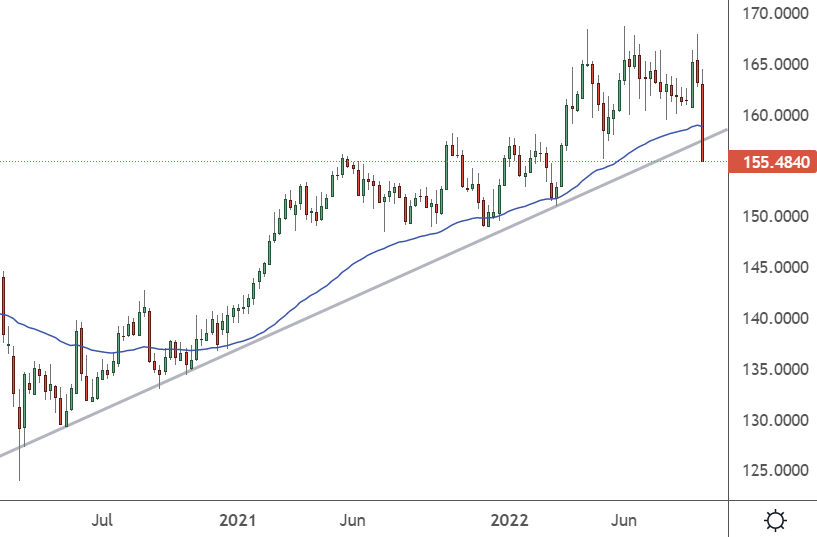The GBPJPY pair dropped sharply last week after Japanese intervention and UK monetary policy collided.
The Bank of Japan intervened in the currency market for the first time since the 1990s, and the new UK Prime Minister, Liz Truss, announced a package of support and tax cuts that will add to Britain’s debt pile.
GBPJPY-Weekly Chart

GBPJPY opened the week around the 163.50 level and dropped to 155.48 to mark the worst weekly performance for sterling since the Brexit referendum result in 2016. There is now a clear path open to the 150 level, but a breach of that has little support at the 140 level.
The changes in the British currency were game changers, putting the previously safe haven of the UK and its gilt bond market in jeopardy. Markets will also take into account the Russia and Ukraine situations and see that their funds may be safer in the likes of Japan.
The economic calendar starts with a speech from the Bank of Japan Governor, Haruhiko Kuroda. His comments could add fuel to the yen rally of the last week, and it is possible that his speech will be targeted for that outcome. A central bank that has just committed capital to defend its currency would love to see immediate gains in its investments and scare the bears away.
Kuroda will leave his post in April of 2023, and there is likely to be little change in the ultra-accommodative policy of the BOJ. Kuroda has said recently that the Japanese economy is picking up, but that the bank would not change its interest rate and monetary support “for the time being.”
Bloomberg called the UK’s plan to reduce taxes and deregulate “a straight-up gamble with Britain’s future” and added that the plan was already unravelling with a crash in sterling.
“The markets will do what they will,” said UK minister Kwasi Kwarteng after being questioned about the effects the change would have on the currency market.
Bloomberg added, “There was still a sense of shock in how far her chancellor went, scrapping the top rate of income tax in a boost to the highest earners, as well as delivering on cuts to corporate taxes, national insurance contributions, and levies on home purchases that had been flagged in advance.”
“The final total didn’t even include the full cost of capping household energy bills for the next two years. That could add another £100 billion to taxpayers’ liabilities. The tax cuts will cost the Treasury around £161 billion over the next five years. A further energy guarantee will add about £60 billion to that sum in the next six months, the only figure the Treasury provided. “
“Investor confidence is being eroded fast,” said George Saravelos, global head of foreign exchange research at Deutsche Bank, as he called for an emergency interest rate hike to reinstate faith in the Bank of England.


